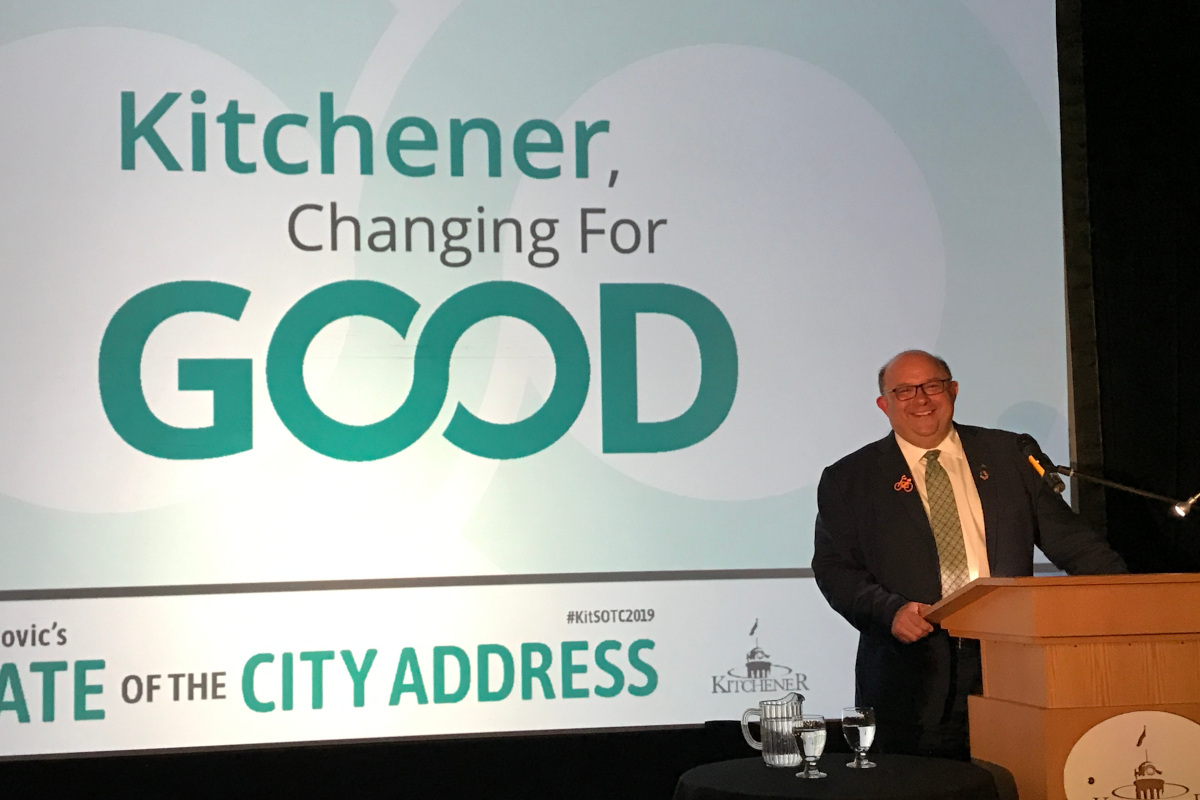For 25 years, Berry Vrbanovic has been sitting on the Kitchener council.

He served as a councillor in Ward 2 for the first 20 before becoming the city’s mayor in 2014.
The Kitchener mayor was recently honoured for his long-standing service to the community.
“It’s flown by, to be honest with you,” Vrbanovic said. “It’s been really remarkable to have the opportunity to play a small role (together with your colleagues and our staff and community members) in seeing how our community’s journey in history has developed over the last while.”
He says that there have been several major changes to his role over the last decade but one that stands out is the use of communications technology.
“You may think back to when I first got on council, I mean, most things happened in person or by phone,” Vrbanovic explained. “Now most things happen either by email or via social media.”
He says the use of newer technologies such as Twitter and email to communicate is a double-edged sword.
Vrbanovic said one of the positive aspects of newer forms of communication is that “it’s helped us connect with people more.”
“On another front, it’s actually, I think, made things more challenging because people are always sort of looking for that instantaneous response as opposed to a thoughtful, measured response on issues at times,” he added.
The mayor says the fact that tone can often be misconstrued in email and social media conversations has also created issues in dealing with Kitchener residents.
“We’ve all sort of fallen victim to this where we think we’re writing something in an email and the tone of it is a certain way and then people read it a different way,” Vrbanovic said. “That, certainly, I think, has made politics a little more challenging.”

Get breaking National news
Another major change in his role is the shrinking media presence, which has concerned the long-time Kitchener politician, not only with respect to Waterloo Region but also around the globe.
“It’s one of the things that actually really worries me a lot,” he said. “I think a strong media is actually an important part of a healthy democracy from a philosophical point of view because it’s part of the checks and balances in the system.”
One of the saddest stories of the last decade for the Kitchener mayor was when the Schneiders facility closed down and its operations were moved to Hamilton by parent company Maple Leaf Foods.
The company had been a Kitchener mainstay for 90 years before the last pack of sandwich meat rolled off the assembly line in 2015.
“That was a company that had such a long history and such a legacy in this region.
“With so many people, particularly new Canadians, who ended up working there as they immigrated to this country, into this community, that was probably one of our low points,” Vrbanovic said.
He says he understands why the company made the move but remains saddened by the decision and the loss of 1,200 jobs that went with it.
“I think as a community we’re fortunate because we continue to have a thriving manufacturing sector,” Vrbanovic said, noting that between 17 and 20 per cent of the economy revolves around the manufacturing sector.
While the sector is still strong, he says that number is a drastic reduction from the city’s historical numbers.
“The economy was very much focused on automotive parts, rubber food processing, with companies like Lake Schneiders,” Vrbanovic said. “And so seeing many of those jobs be lost over the years (and many of them were before this decade), certainly, it was part of the transitional story of our community.”
Waterloo region and downtown Kitchener have been reinvented into a host for companies like Google, Vidyard and Igloo.

“It’s been great to see how Google, in particular, and Communitech’s presence down here has brought other companies like North, like Vidyard,” the Kitchener mayor said. “So many others, both in the startup and the scale-up phase, become part of our success story going for.”
While Kitchener has seen a change to its economic base over the last decade or so, the city has also seen its makeup continue to evolve.
“We’re increasingly becoming a more and more diverse community.
“One of the things that I think as a community we can pride ourselves in is how over the decades we’ve been a welcoming community,” Vrbanovic said, noting the region’s history, which included welcoming Mennonites and Vietnamese boat people in large numbers.
“One of the things that I’m still most proud of is the fact that as a community, we represented about 1.3 per cent of the Canadian population, yet we welcomed about five per cent of the Syrian refugees that came as part of that wave that the federal government brought in in early 2016,” he said.









Comments